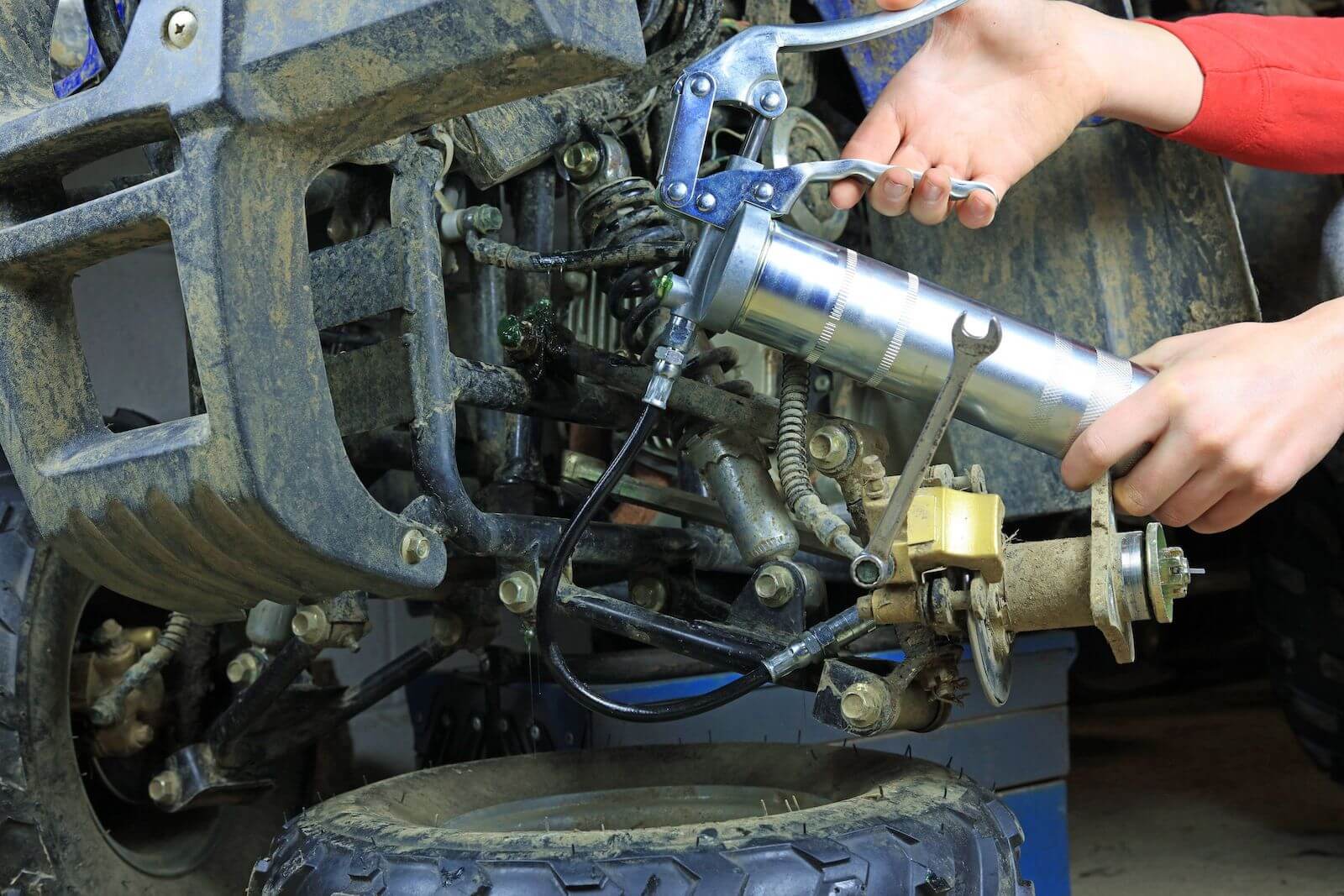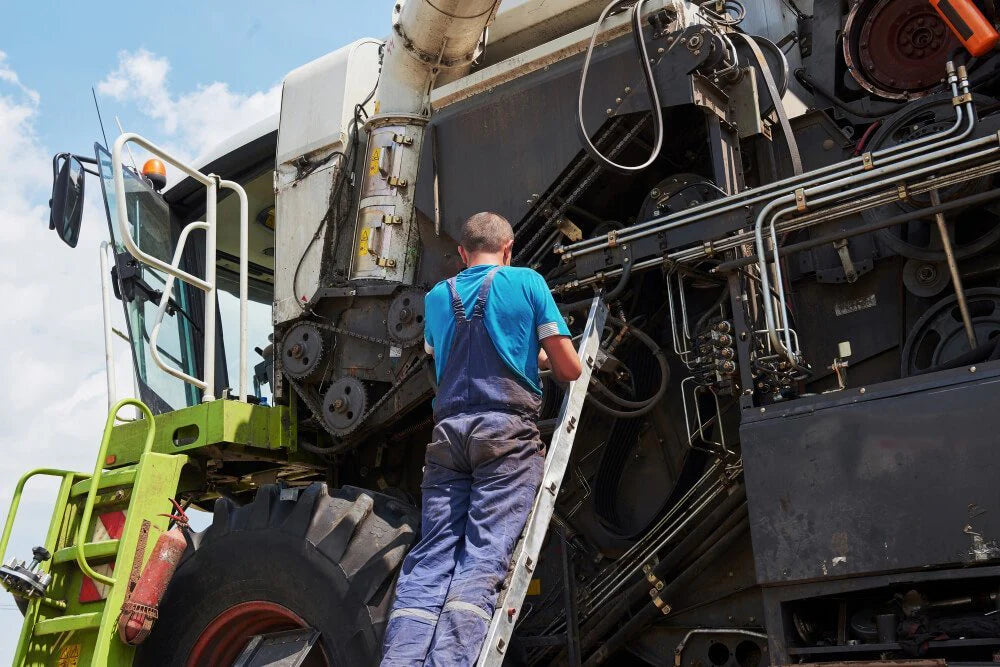Selecting the ideal grease for your heavy machinery is a crucial aspect of maintaining its performance, reliability, and longevity. There are various alternatives available on the market, and the consequences of using the wrong type of lubricant can be both costly and time-consuming.
In this guide, we aim to provide you with the information and knowledge needed to make an informed decision on grease selection, ensuring that your heavy equipment operates smoothly and efficiently.
Understanding The Essentials of Grease
Grease plays a vital role in maintaining the proper functioning and longevity of heavy equipment. By providing all components with adequate lubrication, it reduces both damage and wear and tear caused by friction between moving parts. Furthermore, it protects the machinery against contaminants and corrosion and helps redistribute heat, ultimately promoting efficiency and preventing downtime.

There are various types of greases available, including:
Mineral-based greases are produced from refined petroleum oils and are most commonly used in general purpose applications.
Synthetic greases are made from synthetic base oil and perform better than mineral-based greases under extreme operating conditions, such as high temperatures or heavy loads.
Semi-synthetic greases combine the benefits of both mineral-based and synthetic greases, offering intermediate performance characteristics.
Understanding the purpose and advantages of each type of grease is essential to determine which one is best suited for your specific heavy equipment.
Lube-Shuttle®: Lever Handle Grease Gun
Lever Handle Air-Tec Lube-Shuttle® Grease Guns are made of the highest quality steel tubes with corrosion-resistant zinc plating.
shop nowKey Factors to Evaluate When Choosing Grease
Choosing the right grease for heavy equipment involves considering several factors to ensure optimal performance and protection. Here are the three primary aspects to consider:
1. Type of equipment
Different types of heavy equipment may have specific requirements depending on their design, material composition, and function. For example, a construction vehicle might necessitate grease points with excellent water resistance, while equipment under constant heavy loads might require a high-pressure grease to provide adequate protection against extreme pressure.
2. Operating environment
The conditions under which your equipment operates play a significant role in selecting the appropriate and best grease for heavy equipment. Consider the following factors:
Temperature: Equipment operating in extreme temperatures may need a grease with specific properties, such as high-temperature stability or low-temperature fluidity.
Moisture: Equipment routinely exposed to water or wet conditions may require a grease that offers excellent water resistance and corrosion protection.
Dust and contaminants: Machines operated in dirty, dusty or colder environments need a grease capable of preventing the ingress of contaminants to avoid premature wear and tear.
3. Performance requirements
Assess the performance requirements of your equipment to identify the features needed in a grease. These may include high load carrying capacity, oxidation stability, and compatibility with the materials used in your heavy machinery.
AirTec Grease: Li400 Extreme Duty Grease
Li400 is the flagship grease from AirTec. Thickened with Lithium complex and reinforced with AirTec/Wagner Micro Ceramic Li400’s performance under extreme temperatures and pressures puts it in a class of its own.
shop nowHow to Decode Grease Specification
Understanding heavy equipment grease specifications is an integral part of selecting the ideal grease for your heavy machinery. It provides clues as to a particular grease’s performance characteristics and applicability for specific equipment and operating conditions.
One primary specification metric is the NLGI (National Lubricating Grease Institute) rating. It’s a measure of the hardness or consistency of the grease. NLGI ratings range from 000 (fluid) to 6 (solid block), with the most common being 2. A higher NLGI rating means a harder grease—these are typically used in high-temperature situations. Conversely, a lower grade indicates a softer, more fluid grease suited to cooler temperatures or high-speed applications.

In addition to the NLGI rating, grease containers typically list several other specifications, such as:
Dropping Point: This specifies the temperature at which the grease changes from a semi-solid state to a liquid, indicating its suitability for high-temperature applications.
Timken OK Load: This is a measure of the maximum load a grease can handle before it starts to fail, indicating its load-carrying capacity.
Understanding these terms and their relevance to your machinery’s operating conditions and requirements will guide you in making a more informed decision when choosing the right grease.
Case Studies: Picking the Right Grease
Seeing how different types of grease perform in real-world situations can illuminate their benefits and drawbacks. Let’s look at several examples:
Example 1: High-Temperature Operation – A construction company was frequently replacing the bearings in its asphalt pavers due to the high operating temperatures. After switching from a standard grease to a high-temperature synthetic grease with a higher dropping point, they noticed a reduction in equipment failure and a consequent decrease in downtime and repair costs.
Example 2: Water Exposure – A shipping port was experiencing frequent corrosion-related issues in their cranes due to the machines’ constant exposure to seawater. By changing to a marine-grade grease with superior water-resistance, they improved equipment longevity and reduced maintenance costs.
Example 3: Dusty Conditions – A mining company was reporting accelerated wear in their earth-moving machinery due to the dusty environment. Upon switching to a heavy-duty, dust-resistant grease, they noticed a considerable improvement in machinery lifespan.
These examples demonstrate the importance of selecting the right grease based on equipment operator, machinery type, operating environment, and performance requirements.
The Importance of Expert Guidance and Product Testing
When selecting a grease for your heavy machinery, expert advice is a valuable resource. Lubrication specialists possess a wealth of knowledge and expertise that can provide tailored recommendations based on your machine and specific needs and conditions.

Moreover, product testing plays a significant role in ensuring the grease’s efficiency and compatibility with your machinery. Such testing can include:
Compatibility Testing: This involves testing the new grease’s compatibility with the existing grease in your equipment. Incompatibility can lead to issues like reduced consistency or compromised lubrication.
Performance Testing: Lab tests can simulate operating conditions and assist in understanding how the grease will perform in real-world scenarios.
By leveraging expert guidance and thorough product testing, you can more confidently select a grease that will keep machine components in your heavy machinery running smoothly and efficiently.
AirTec Grease: G200 Multi-Purpose Plus
AirTec’s G200 Grease is a premium multi-purpose grease. It features a calcium sulfonate complex thickener, EP additives, and a heavier base oil than most multi-purpose greases.
shop nowGuide to Applying Grease to Your Equipment
Proper application of greasing heavy equipment is just as critical as selecting the right grease type. Here are some best practices to follow:
Clean the Application Area: Before applying your grease, thoroughly clean the application area to prevent contaminants from mixing with the grease and creating abrasion.
Use the Proper Tools: Use a professional-grade grease gun to ensure precise application. Different attachments can help you reach difficult spots and apply the correct amount of grease.
Apply the Correct Quantity: Over-greasing can be as harmful as under-greasing. Monitor the machine’s performance carefully to determine the right amount of grease to apply.
Know When to Reapply: The reapplication frequency depends on the specific heavy machinery and the operating environment. As a rule of thumb, grease should be reapplied after every 100 hours of operation. This varies based on load, speed, contamination levels, and ambient temperature, so always follow the manufacturer’s recommendations.
Wrapping Up: The Long-term Impact of Correct Grease Selection
Properly lubricated parts is vital to the overall health and longevity of your heavy machinery. Selecting the correct grease and applying it optimally can save you significant time and money over the long term. It reduces the amount of wear and tear on your equipment, lowers maintenance costs, and can even prolong your machinery’s service life.
Understanding grease specifications and the unique needs of your machinery will guide you towards making an informed decision. Remember, when in doubt, seek expert advice.
FAQs
What kind of grease do you use on heavy equipment?
The type of grease used on heavy equipment depends on the specific machinery and the operating conditions. Some common greases include lithium complex grease, moly grease, and synthetic grease.
What is the best grease for heavy trucks?
Heavy trucks often operate under challenging conditions, requiring a robust, high-performance grease. Lithium complex grease, which exhibits excellent heat resistance, good load-bearing capabilities, and resistance to water washout, is a reliable choice.
Is moly grease good for heavy equipment?
Yes, molybdenum disulfide (moly) grease is excellent lubricants for specific heavy equipment applications. It forms a protective layer over the surface, which reduces friction and handles high loads effectively, making it ideal for construction and mining equipment.
What type of grease is heavy duty?
Heavy-duty grease is for those with high load-carrying capabilities and excellent resistance to high temperatures and environmental contaminants. Examples are lithium complex greases, calcium sulfonate greases, and certain synthetic greases.
What kind of grease is used for heavy duty?
Heavy-duty applications typically use greases with excellent high-temperature stability, superior load-carrying capacity, and great resistance to water and contaminants. Some popular grease options used include lithium complex greases, molybdenum greases, and calcium sulfonate greases.









